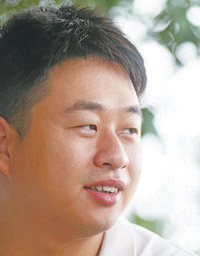

Huang Yanhai, 29, is one of the young people who followed their parents in planting trees to help control water and soil loss in Sanzhou, Fujian province.
During the day, Huang Yanhai prunes waxberry trees in his father's orchard in Sanzhou, Changting county. When it gets dark, the 29-year-old spends hours designing animated monsters for cybergame developers.
Huang, a former professional animator who worked in cities such as Shanghai and Hangzhou, capital of Zhejiang province, returned to his hometown of Sanzhou in 2013 to help his father take care of the orchards.
Huang Jinyang, his father, 61, is the first farmer in the town to plant waxberry and ornamental trees that help control water and soil loss, a problem that has long plagued the area.
Having graduated from university in 2003, Huang Yanhai said he got used to the fast-paced life in big cities and was ready to strut his stuff as an animator.
"When I received a phone call from my father two years ago, he asked me to come back to help him with the orchard business. Initially I felt a bit reluctant, because I thought in that case I could not continue my animation dream."
"Nothing is more important than sharing the burden and easing worries for my father," Huang said.
A quick learner, Huang picked up farming skills such as tree-planting and tree-care techniques from his father soon after he returned to Sanzhou.
"It's nice to come back and see the hills that were barren in my childhood become verdant, as many villagers are dedicated to the forestation business to solve soil erosion," Huang said.
Adding to Huang's joy is that several companies he worked for still ask him to create animated characters.
"After finishing the orchard work, I usually focus on the animation project at 7 pm and will spend five hours on it," Huang said.
The part-time job could earn Huang 11,000 yuan ($1,790) per month, roughly equal to his monthly salary in Shanghai.
The orchard generates more than 10,000 yuan of net income a year for Huang.
"In the future, I want to invest the money earned from the animation projects into making waxberry wine to expand my green business," Huang said.
Joining those in Changting's younger generation who protect the environment is Lin Xinrong, who in 2012 quit his job as an accountant in Longyan, Fujian province, and returned to Sidu, where his father planted tea-oil trees and operated a pig farm.
The 25-year-old, who had no experience living in a rural area, came to the town out of a sense of responsibility and obligation.
His father, Lin Muhong, 66, started to plant tea-oil trees on barren hills in 2008 to fight the town's soil erosion.
Now, more than 500 hectares of trees have been planted.
"I studied everything, such as applying fertilizer and removing grass," Lin said.
He also needed to deal with emergencies such as getting a vet for a pig that had difficulties giving birth.
"My father is too old to handle all of this by himself. It is correct and necessary that I've come back," Lin said.
Given it takes about a decade to gain profits from planting tea-oil trees, Lin was in no hurry to make a fortune.
"Some trees are growing as tall as me, and I'm sure they will bring me sweet fruits," Lin said.
Wu Chenghuo, director of the county's forestry bureau, said young people are an important force for building a more beautiful Changting.
"They make the green business sustainable as many farmers have become old," Wu said.
To encourage more young people to get in on the action, the bureau has been offering free tree seeds and technological guidance to youths who continue their fathers' projects, Wu said.
Copyright ©1999-2018
Chinanews.com. All rights reserved.
Reproduction in whole or in part without permission is prohibited.